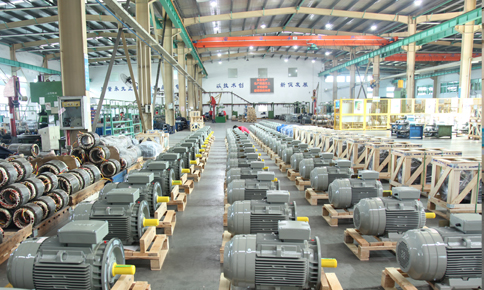Efficient Motor Manufacturing Technology and Development in China

This year marks the 65th anniversary of the establishment of diplomatic relations between China and Switzerland. With the guidance and strong support of the Chinese Ministry of Industry and Information Technology, the Swiss Ministry of Economic Affairs, and the Swiss Embassy in China, the conference was held for the first time in China. Afterwards, the conference will be held every two years in China, complementing the biennial conference held in Zurich, Switzerland, gradually forming a long-term industry exchange and cooperation platform that radiates to major economies in the Asia Pacific region.
At this conference, Swiss Ambassador to China Jean Jacques Dardel and Chairman of the International High Efficiency Motor Conference Motor Summit Conrad? Conrad Brunner, Director of the Energy Conservation and Comprehensive Utilization Department of the Ministry of Industry and Information Technology Gao Yunhu, Deputy Director of the National Standards Committee Yin Minghan, Deputy Director of the Jiangsu Provincial Commission of Economy and Information Technology Li Qiang, and Deputy Mayor of Zhenjiang Jiang Jianming attended the meeting and delivered speeches. These top experts in the industry gathered together to focus on improving the energy efficiency of motor systems, analyzing and drawing on international experience and domestic practices, exploring innovative ways to break down barriers to the development of the high-efficiency motor market, and seeking solutions for building a good energy-saving service market ecosystem for motor systems in China. They hope to truly achieve large-scale transformation through market-oriented mechanisms and gradually penetrate the international market.
In addition, experts from around the world have explored energy policies and solutions in various countries from the perspectives of policies, technologies, markets, and management models. Gao Yunhu introduced the importance and urgency of improving motor energy efficiency in China, and pointed out that this work should be regarded as an important task in the current and even the 13th Five Year Plan for industrial energy conservation and emission reduction, and included in the special action for industrial green development. The next key direction is to promote energy conservation of motor systems through market-oriented mechanisms in industries and fields. Gao Yunhu also affirmed the achievements of the energy-saving pilot project for motor systems carried out in cooperation between Zhenjiang City and the Top 10 Energy Conservation Centers in Switzerland, and pointed out that the improvement of motor system energy efficiency should further strengthen international cooperation and draw on advanced experience. Yin Minghan emphasized the role of standardized access and benchmark guidance in energy conservation. As of now, China has issued 65 mandatory energy efficiency national standards, 79 mandatory energy consumption limit national standards, and more than 100 recommended energy-saving national standards. The next step will be to expand the coverage, update in a timely manner, and strengthen supervision and implementation. Richard Phillips, the head of motor systems at the Swiss Ministry of Energy, introduced the three main directions of Switzerland's energy-saving policy for motor systems: minimum energy efficiency standards, fiscal incentives, and voluntary non-financial incentives. He pointed out that in order to realize the energy-saving potential of ******, it is necessary to organically combine mandatory and voluntary measures. Takeshi Obata, Chairman of the High Efficiency Motor Promotion Committee of the Japan Electric Machinery Industry Association (JEMA), shared the experience of the Top Runner high-efficiency motor project in Japan. As an important part of the implementation of Japan's Energy Conservation Law, this plan will be implemented in Japan from April 1st this year. After implementation, motor manufacturers and importers must report the average energy efficiency index of motors sold or imported annually; Energy consuming enterprises need to reduce their energy consumption by at least 1% annually based on their own situation. Dan Delaney from RegalBeloit, a US based company, revealed that a global motor energy efficiency project (GMEE) plan will be officially launched in September this year, aiming to eliminate common trade barriers faced by motor manufacturers and enable coordinated mutual recognition of different testing methods, laboratory accreditation, sampling and testing processes in different countries.
The reporter learned that the Chinese government also attaches great importance to improving the energy efficiency of motors. According to data from the National Small and Medium sized Motor and System Engineering Technology Research Center, the sales market share of high-efficiency motors increased from 4% in 2011 to 17.25% in 2013. In 2013, the Ministry of Industry and Information Technology and the General Administration of Quality Supervision, Inspection and Quarantine jointly released the Motor Energy Efficiency Improvement Plan (2013-2015) to promote the improvement of motor energy efficiency at the national level. After two years of effort, we have completed the energy-saving renovation of about 40 million kilowatts of motors, "Yuan Ling, Energy Conservation Department of the Energy Conservation and Comprehensive Utilization Department of the Ministry of Industry and Information Technology, revealed to reporters the work and achievements of the motor energy efficiency improvement plan. However, he also admitted that "the current policy support for improving motor energy efficiency in various provinces across the country is different, resulting in a significant gap in work effectiveness and progress." In response, he suggested that "policies for different industries and fields need to be further refined, and innovative market-oriented promotion models are urgently needed

